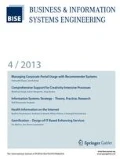
Notes
References
Deterding S, Dixon D, Khaled R, Nacke L (2011) From game design elements to gamefulness: defining gamification. In: Proc 15th MindTrek conference, Tampere, pp 9–15
Gartner (2012) Gamification: engagement strategies for business and IT. Report G00245563
Haller J, Bullinger A, Möslein K (2011) Innovation contests. An IT-based tool for innovation management. Bus Inf Sys Eng 53(2):105–108
Huotari K, Hamari J (2012) Defining gamification – a service marketing perspective. In: Proc 15th MindTrek conference, Tampere, pp 17–22
Lee JJ, Hammer J (2011) Gamification in education: what, how, why bother? Academic Exchance Quarterly 15(2):1–5
Leimeister JM (2012) Dienstleistungsengineering und -Management. Springer Gabler, Berlin
McGonigal J (2011) Reality is broken. Why games make us better and how they can change the world. Pinguin Press, New York
Ortiz de Guinea A, Markus ML (2009) Why break the habit of a lifetime? Rethinking the roles of intention, habit, and emotion in continuing information technology use. MIS Quarterly 33(3):433–444
Österle H, Winter R (2003) Business Engineering: Auf dem Weg zum Unternehmen des Informationszeitalters. Springer, Heidelberg
Petkov P, Köbler F, Foth M, Medland RC, Krcmar H (2011) Engaging energy saving through motivation-specific social comparison. In: Proc conference on human factors in computing systems, Vancouver, pp 1–6
Ryan RM, Deci EL (2000) Intrinsic and extrinsic motivations: classic definitions and new directions. Contemporary Educational Psychology 25(1):54–67
Simões J, Redondo RD, Vilas AF (2013) A social gamification framework for a K-6 learning platform. Computers in Human Behavior 29(2):345–353
Von Ahn L (2006) Games with a purpose. Computer 39(6):92–94
Weis F, Leimeister JM (2012) Consumerization. IT innovations from the consumer market as a challenge for corporate IT. Bus Inf Sys Eng 54(6):351–354
Zichermann G, Cunningham C (2011) Gamification by design: implementing game mechanics in web and mobile apps. O’Reilly, Sebastopol
Acknowledgements
This paper presents outcomes of the research project “Produse” that is funded by the German Ministry of Research and Education under contract No. 01FL10043. For further information please visit: http://projekt-produse.de/projektbeschreibung/
Author information
Authors and Affiliations
Corresponding author
Additional information
Accepted after one revision by Prof. Dr. Sinz.
This article is also available in German in print and via http://www.wirtschaftsinformatik.de: Blohm I, Leimeister JM (2013) Gamification. Gestaltung IT-basierter Zusatzdienstleistungen zur Motivationsunterstützung und Verhaltensänderung. WIRTSCHAFTSINFORMATIK. doi: 10.1007/s11576-013-0368-0.
Rights and permissions
About this article
Cite this article
Blohm, I., Leimeister, J.M. Gamification. Bus Inf Syst Eng 5, 275–278 (2013). https://doi.org/10.1007/s12599-013-0273-5
Received:
Accepted:
Published:
Issue Date:
DOI: https://doi.org/10.1007/s12599-013-0273-5

